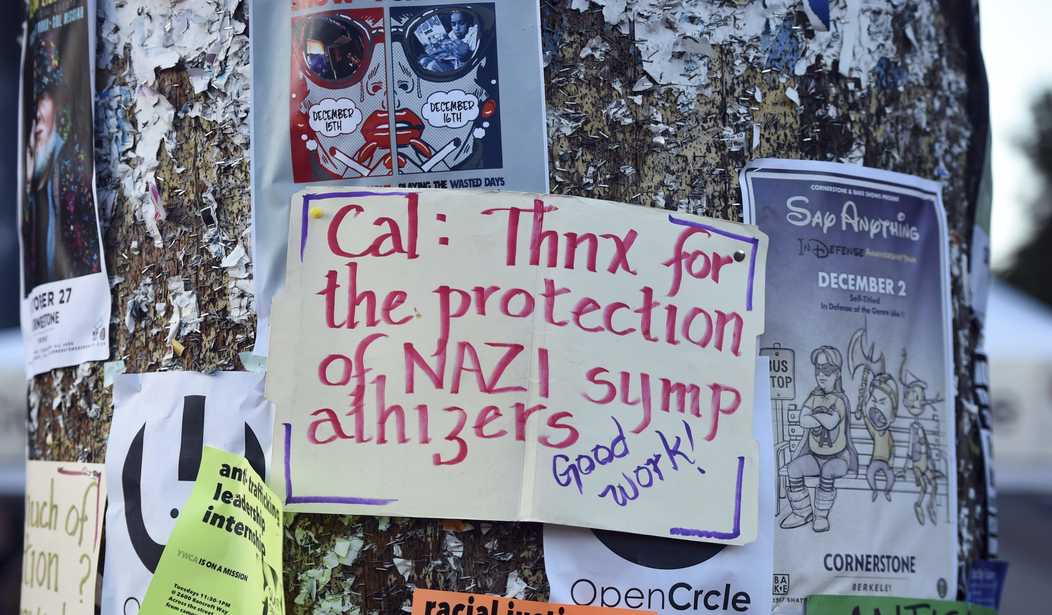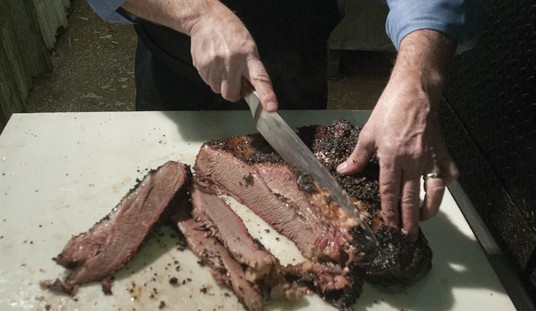In an article focusing on free speech on the campus, The New York Times tells its readers that the UC Berkeley faculty is divided over whether or not the university should allow right-wing speakers to appear on campus. Their most recent concern was motivated by a “Free Speech Week” event that was being put together by provocateur Milo Yiannopoulos, who was invited by a small campus group called Berkeley Patriot. He was going to appear on the campus in February, but his scheduled speech was canceled after protesters prevented it from taking place. The upcoming event was scheduled to take place from September 24-27, but as Rick Moran reports in these pages, it was announced today that Berkeley Patriot canceled the event. Participants initially mentioned were Steve Bannon and Ann Coulter, but now it has become apparent that neither planned to attend. Listed speaker Charles Murray announced he would not participate in any event Milo had arranged “because he is a despicable asshole.” Murray’s name, moreover, was listed without his knowledge or consent. All of these announced speakers regularly enrage leftist students and send them into conniptions.
To confound issues even more, Milo Yiannopoulos announced he would appear and speak anyway at the famous Sproul Plaza, the site of the 1964 Free Speech Movement protest. Promising surprises, he now is asserting his right to free speech as a private citizen to speak on campus without any formal group sponsorship or invitation. Saying he would appear this Sunday at noon, there is certain to be a large police presence as well as a vast group of leftist protestors, most likely including Antifa groups.
The highlight at the now suspended conference was to be the “Mario Savio Award,” given to the individual who in their eyes has most represented the idea of free speech. The name of the award is also meant to anger liberals. Mario Savio led the famous Berkeley protests in the 1960s. When the university moved in October of 1964 to prevent a protestor from speaking, students spontaneously surrounded the police car he had been put in. Savio gave an eloquent speech that made him famous from on top of the police car. Soon 3000 or more students arrived. Then they took over Sproul Plaza, the administration building. Eventually, scores of police arrived and arrested those students who had taken over the building. Now Yiannopoulos is co-opting the once liberal and leftist cause of free speech as his own, and in effect positing that he and his associates are the ones acting in Savio’s spirit. An organizer of the original ’60s protests, playwright and author Barbara Garson, called Free Speech Week a “grotesque parody” of the movement she helped lead.
As of today — the 23rd — the event will not take place. Yet Milo’s appearance — should he show up — has forced the university authorities to spend one million dollars arranging for security, since they fear the kind of violence that erupted in Charlottesville when Antifa appeared to contest the neo-Nazis and racists who planned a rally there. It’s getting very expensive for conservatives to speak. Recently, Ben Shapiro spoke without incident and reported he had a fruitful exchange of opinion with liberal and leftist students, although security for his talk cost UC Berkeley $600,000.
Moreover, scores of faculty members, fearing violence, have on their own canceled their classes on the chosen dates. “It’s just not safe to hold class,” Professor Katrin Wehrheim told the Times. “This is not about free speech. These people are coming here to pick a fight.” Prof. Wehrheim noted that in Germany today, one can be jailed for hate speech. Some faculty members argue that violence against the speakers participating at Free Speech Week is justified since they view them as “fascist intruders” at their university. Two hundred professors and graduate students have signed a petition calling for a boycott of all classes in protest of the “pro-fascist” speakers who they believe have no rights. An anthropology professor, Nancy Scheper-Hughes, who ironically teaches a course on the relationship of free speech to hate speech, said that “words can be like rape — they can destroy you.” She favors, of course, a change in our laws so First Amendment rights would be limited. “The Supreme Court is behind the times,” she said. “The First Amendment deserves to be re-looked at.”
There are faculty members, thankfully, who are taking the position that free speech is invaluable and to be protected. The university’s new chancellor, Carol T. Christ, is a leading advocate, emailing students that “universities are fundamentally dedicated to free inquiry… .This commitment is fundamental to academic freedom.”
The truth, however, is that, increasingly, faculty and students, the majority on the far left and moderate left, oppose free speech for those with whom they disagree. A recent Brookings Institution survey concluded that 44 percent of college students polled believe that anything they deem “hate speech” is not protected by the First Amendment.
How did this come about? Some of those leftist professors at UC Berkeley have surely read the late philosopher Herbert Marcuse, who argued in the 1960s that capitalism had exhausted itself and that the old paradigm of tolerance was no longer relevant. Instead, being tolerant serves the needs of the oppressors who use it to hold onto and protect their power. It was thus the duty of the left to deny the free speech of the right, since the only truth lies with those who are oppressed. The masses, he said, had to be freed from the “indoctrination” imposed on them by the unjust “established society” by preventing those propagating the values of the capitalist system from speaking and having influence.
Consequently, he called for “the withdrawal of toleration of speech and assembly from groups or movements which promote aggressive policies, armament, chauvinism, discrimination on the grounds of race or religion.” In the end, Marcuse called for intolerance to be directed at “the self-styled conservatives, [and] to the political Right.” Once in the new left, and now with professors, his “children” have taken to heart what Marcuse argued decades ago.
These concepts have spread far and wide. Writing in the Pacific Standard, David Perry argues the following:
This would be a good moment to change how we address issues surrounding free speech on campus…. I understand the impulse to defend [Milo Y’s] rights among those concerned with free speech, regardless of his vile messaging—but what if he’s just trolling our consciences? What if he never planned this rally, but just wanted the publicity of being “canceled” once again?
And later he adds:
Free speech is messy. One person yells. Another is silenced. These situations require deep thinking and careful investigation of how to defend a core American freedom. What we can’t do is promote simplistic, absolutist fealty to abstract rights without exception because that creates the potential for Yiannopoulos’ mischief.
To put it differently, Perry is saying that we must defend First Amendment rights, except if it allows someone with whom we disagree to do something we don’t like.
Then there are the twists and turns exhibited by Antifa’s self-proclaimed spokesman, Mark Bray. In his handbook for the movement, Bray writes that he and his comrades do not accept “the status of the free speech rights of fascists.” (Always remember that to many of its members, anyone to the right of Bernie Sanders is a fascist.) The issue for them is “the political struggle against fascism.” Hence “the rights promoted by capitalist parliamentary government are not inherently worthy of respect.” Or as one comrade he quotes puts it: “For us anti-fascists, fascists should never be allowed to speak in public. Never.”
Their conclusion is obvious: Free speech exists for the Left only to condemn American democracy and those who celebrate the freedoms Americans enjoy. It does not exist for those who have conservative ideas with which liberals and leftists strenuously disagree. They should be met with protests, kept off the campuses, and have no chance to poison the students’ minds.
Certainly, what we do need is basic education about what the First Amendment means, and why it was added to the Constitution in the first place. Perhaps someone at UC Berkeley may consider a course on that.








Join the conversation as a VIP Member